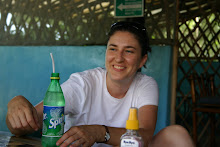I'm trying to settle into my new job and learn all the rules, both spoken and unspoken. It hasn't helped that I have been very ill and had to take days off right when I'm trying to make a good impression with this staff!
So I'm starting later with my project than the other students in my master's cohort. Some of them have already been collecting data and I'm trying to learn where to get my copies made! But I really need to focus now, sit down and make some decisions about my project. I have many ideas and probably need to narrow them down and make sure to connect them to the research literature.
One of the first types of data I want to gather is information from parents and guardians in the form of face-to-face interviews. I don't know if this is too ambitious, as I plan to make this a starting point with how I proceed with my class. Interviews are a fascinating process to me, but they take a lot of time.
What I'm really struggling with is talking with parents about poverty. I'm concerned about building trust with this new community while talking about a topic that has a possible social stigma attached with it. Will they see me as a condescending outsider? Will some parents want to prove how they are not poor? Maybe I shouldn't talk about poverty directly. Maybe instead I should ask about their goals and concerns for their kids. Is that avoiding the issue or giving a basis for my understanding of the community?
Subscribe to:
Post Comments (Atom)


4 comments:
I think you're right that poverty is a touchy subject and that some people might get the wrong impression. It might be a good idea to start with other topics and if you build rapport with some parents then maybe you could bring up the subject.
I hope you are feeling better soon!
I agree with Sarah with regard to how to approach the families. You are new to them and to the area. It would probably be a good idea to begin with the release form that allows you to talk to their children and photograph/video. Tell them you are in a program to make you a better teacher. Don't be surprised if you re-focus your poverty questions from your discussion with the families. I have done just that. My main focus is ELL, however it is more defined. Relax, your project will get done. Take care of yourself and learn about your new community. It will all come together for you! ~Theresa
I have considered this same issue in regards to approaching parents about their child's reading level. Interviewing parents about why their child is a bad reader just didn't sound like the best idea:) But of course I want to get to the root of the problem, just like you want to get to the roots of poverty. I agree that interviews are fascinating and often so much more revealing and informative than quantitative measures.
One suggestion I have is to start out informally. I just started hanging out with my students and lunch and asking informal questions about reading and what they liked etc... I was able to glean many insights from this process. My formal interviews are coming up at the end of the week, so I will let you know how it goes.
Also, use your students information that they give you. The kids in my class are happy to share info. with me! I have one student who doesn't have a bed...I feel like going and buying him one. I gave him a form about free clothes and they wrote back that they didn't need them. He wears shorts without buttons, he needs them, but what can I do? Good luck.
Post a Comment